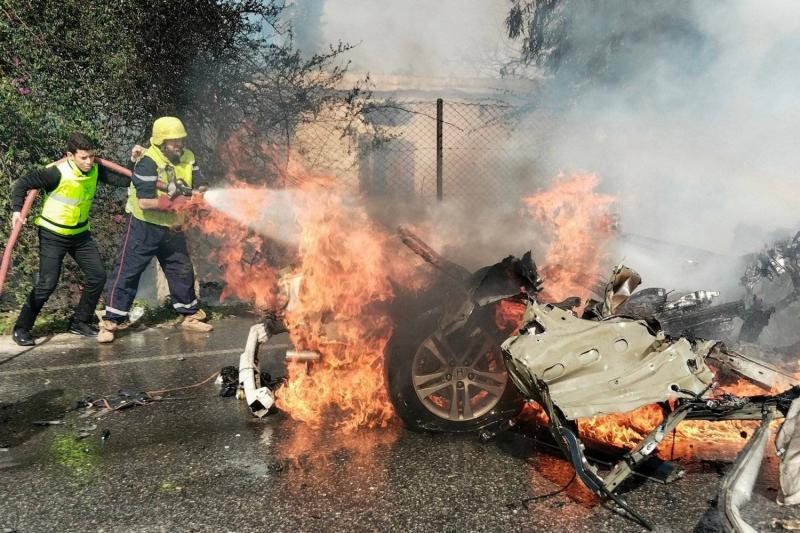Israel's continued targeting of Hezbollah leaders in Lebanon, which has exceeded 300 individuals, raises questions about its strategic goals, especially with the preparations announced by Israeli officials regarding the northern border area. Following the Israeli army's announcement on Wednesday of the killing of Abu Taleb Abdullah, a prominent leader of Hezbollah's "Victory Unit," along with three others in an airstrike on a command and control center in southeastern Lebanon, the army also stated that the party launched at least 215 rockets from Lebanon into northern Israel.
In a statement, the army said: "The last attack was executed against the community of Shlomi in the north of the country. A rocket fell in an open area with no injuries."
Hezbollah's Executive Council Chairman, Hashem Safieddine, vowed to escalate operations against Israel "in terms of quantity and quality."
#### Three Main Objectives
Iranian affairs and Shiite groups expert Mahmoud Jabir summarizes Israel's objectives into three points:
1. **Targeting Reputation**: Hezbollah is one of the most influential political and military entities in the region, with a large popular base in Lebanon and beyond. By targeting its leaders, Israel aims to undermine this reputation and portray Hezbollah as incapable of protecting its leaders and supporters.
2. **Eliminating Strategic Capabilities**: The targeted leaders are part of the core planning and decision-making nucleus and possess immense military and intelligence expertise that has enabled them to execute successful operations against Israel. By killing them, Israel seeks to limit Hezbollah's capabilities in planning and execution.
3. **Gaining Time**: Hezbollah represents a constant threat to Israel. Targeting its leaders can disrupt its activities temporarily, forcing the group into a defensive position, and possibly necessitating a strategic restructuring—thus granting Israel the time needed to prepare for any upcoming threats.
#### Deterrent Message
American political affairs expert Irina Tsukerman agrees that Israel's assassination of such a significant number of Hezbollah leaders aims to disrupt and deter the party. However, she does not expect this goal to be achieved, predicting instead that this ongoing targeting will provoke a stronger reaction from Hezbollah. She describes the Israeli strikes on Hezbollah leaders as "tactically more valuable than strategically," intended to showcase Israel's capabilities to identify and locate leaders and its ability to reach them.
#### Continuation of Assassination Operations and Hezbollah's Response
Political analyst Ali Yahya frames the intense Israeli assassinations as an "attempt to compensate for the lack of a decision to launch a comprehensive military attack" on southern Lebanon. Regarding Hezbollah's response, he states that "it is expected to retaliate through two avenues: the first being a series of retaliatory operations to inflict Israeli casualties to maintain deterrence, and the second involves increasing the intensity of operations in all forms, as per the description of Hezbollah's Executive Council Chairman, Hashem Safieddine."
#### Avoiding Open War
Experts believe that Hezbollah, through its attacks on northern Israel, aims to assert dominance over the escalation trajectory and the geographical area where confrontations are enforced. Simultaneously, the party seeks to avoid entering an open war at this time due to several factors related to regional and international balances.




